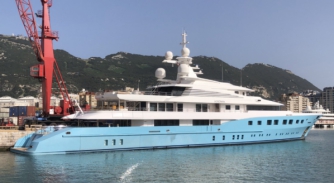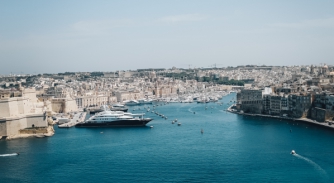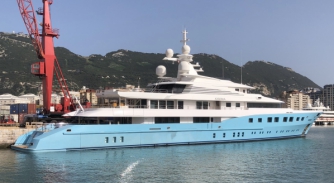Kuzmichev lawsuit explained
Sanctioned Russian billionaire Alexey Kuzmichev has won part of a lawsuit against France’s customs authority over the inability to access his yachts…
Kuzmichev sued the French authorities (his lawyer bought the case before the French court of appeal) in September 2022 in a bid to regain control over his vessels La Petite Ourse and La Petite Ourse II, held in the Cote D'Azur towns of Antibes and Cannes, respectively.
In an interview with Reuters, Kuzmichev’s lawyer, Philippe Blachetier, argued that customs officials did not have the right to immobilise the yachts. Blachetier pointed out that when raiding the yacht French customs officials made procedural errors: "If you own an asset for your personal use, like a yacht, you have the right to make use of it even though it's frozen", Blanchetier informed Reuters prior to the ruling. Kuzmichev, one of the main shareholders of Russia’s Alfa-Bank, was sanctioned by the EU in March 2020 for having close ties with Vladimir Putin.
The judgement, made this morning by the Paris court of appeals, ruled that French customs’ move to board and immobilise “La Petite Ourse” was “irregular” and annulled the raid, according to Bloomberg. The judges concluded that the second lawsuit “La Petite Ourse II” should have been filed at another court, and did not take a decision on it. The court of appeals in Rouen is due to take up the case.
SuperyachtNews speaks to France-based Superyacht Lawyer Jean-Philipe Maslin of Richemont Delviso, for further insight into the background of the case, and how it compares to the broader range in sanctions enforcement internationally:
“In France, it's left up to the French customs to enforce (EU sanctions). How it works is that automatically and just by virtue of the regulation being published, the assets are considered frozen as long as they're owned or controlled by a designated person or sold within the purview of the EU regulation. There is no actual seizure of the asset. It is just frozen, prevented from being used, prevented from being sold.”
Maslin spoke about the arrest of a yacht making customs liable for said arrest and therefore become the custodians or guardians of each vessel, as was the case with the arrest of Amadea in Fiji. However, Maslin explains, “French customs don't apply this. They consider basically that the person that owns the vessel is the custodian and guardian.”
Maslin explained that the readiness of French Judges to uphold the rights of Designated Persons when their rights have been breached stems from the precedent of an arrest by French customs officials on a cargo vessel, the Pola Ariake. The ship was owned and operated by the Ministry of Transport in Russia, who was part of Putin’s inner circle. However, when the French Customs initially refused to release the vessel contrary to the court order:
“The owner sued them again in court for breach of the court order and obtained approximately €100,000 in damages, according to the reports....They (French Customs) are liable for 1% of the value of the vessel for the months during which it was arrested. So the liability is extremely, extremely high and increases very rapidly for the French. That's why they only arrest vessels specifically when they're certain of it. Otherwise, they just notify of the freezing of the asset.”
NEW: Sign up for SuperyachtNewsweek!
Get the latest weekly news, in-depth reports, intelligence, and strategic insights, delivered directly from The Superyacht Group's editors and market analysts.
Stay at the forefront of the superyacht industry with SuperyachtNewsweek
Click here to become part of The Superyacht Group community, and join us in our mission to make this industry accessible to all, and prosperous for the long-term. We are offering access to the superyacht industry’s most comprehensive and longstanding archive of business-critical information, as well as a comprehensive, real-time superyacht fleet database, for just £10 per month, because we are One Industry with One Mission. Sign up here.
Related news

Antecedents to Axioma
The intriguing story of Axioma and the consequences of associated sanctions runs deeper than the bidding war
Business

Maltese government cracks down on brokers selling subsidised fuel
A new amendment came into force last Friday to prevent the exploitation of Malta’s price stability policy on fuel prices
Fleet
.jpg)
What becomes of the superyachts owned by sanctioned Russians?
We speak to some of the industry's best lawyers to understand what the possible outcomes could be for superyachts with sanctioned Russian owners
Business

72m Axioma will sell via judicial auction following arrest
The Supreme Court in Gibraltar have ordered that the Admiralty Marshall should proceed with the judicial auction
Owner
Related news
Antecedents to Axioma
3 years ago
NEW: Sign up for
SuperyachtNewsweek!
Get the latest weekly news, in-depth reports, intelligence, and strategic insights, delivered directly from The Superyacht Group's editors and market analysts.
Stay at the forefront of the superyacht industry with SuperyachtNewsweek



